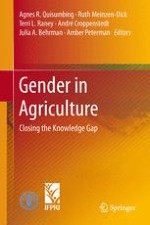2014 | OriginalPaper | Buchkapitel
14. Gender Inequalities in Rural Labor Markets
verfasst von : Jennie Dey de Pryck, Paola Termine
Erschienen in: Gender in Agriculture
Verlag: Springer Netherlands
Aktivieren Sie unsere intelligente Suche, um passende Fachinhalte oder Patente zu finden.
Wählen Sie Textabschnitte aus um mit Künstlicher Intelligenz passenden Patente zu finden. powered by
Markieren Sie Textabschnitte, um KI-gestützt weitere passende Inhalte zu finden. powered by
